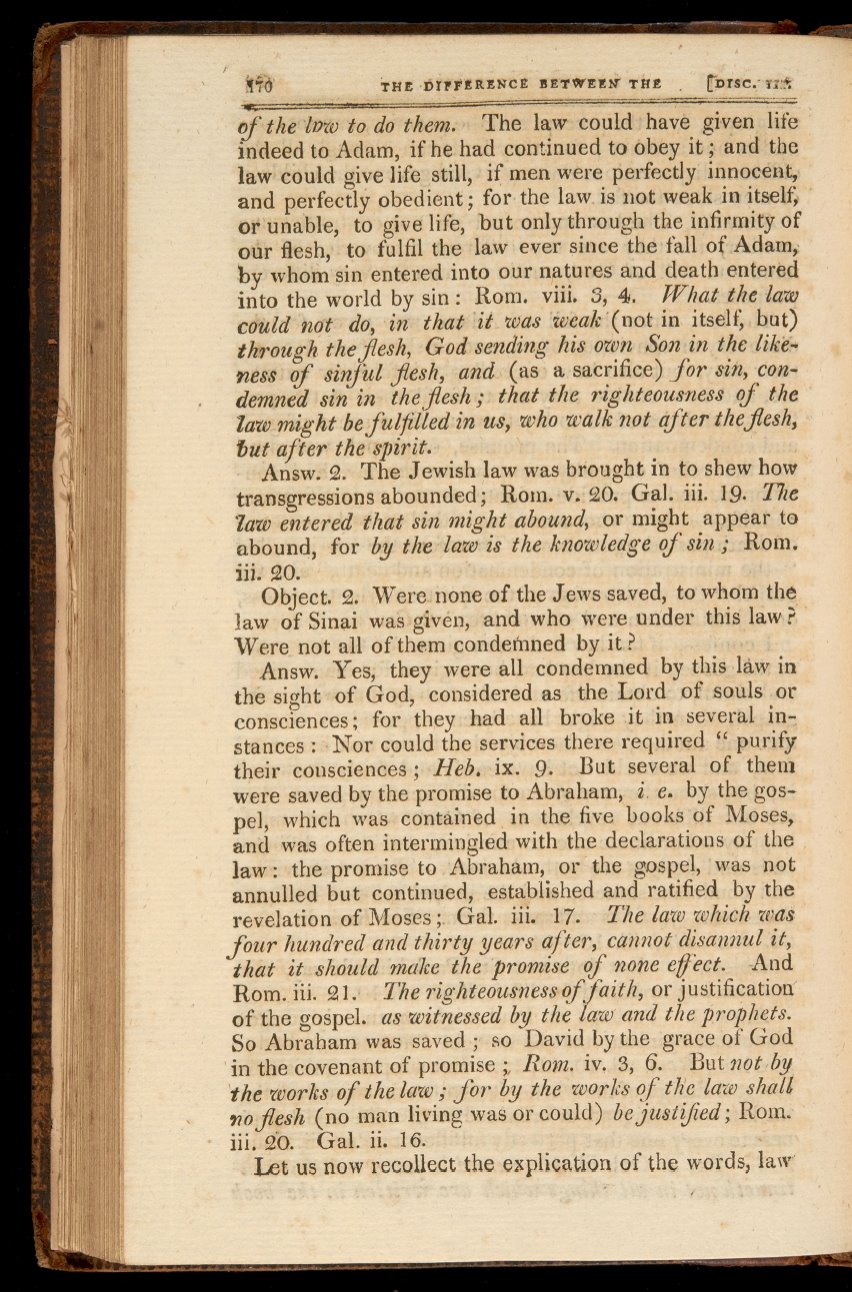

!IiÒ
THE DTFEERENCE
EETVVEEN
THE
CDISC.'
TI:ft
of
the
lyre;
to
do
them.
The
law
could
have given
life
indeed
to
Adam,
if
he
had continued
to obey
it
;
and
the
law
could
give life still,
if
men were perfectly
innocent,
and
perfectly
obedient
;
for
the
law,
is
not
weak in itself,
or
unable, to
give life,
but
only
through
the infirmity of
our
flesh,
to
fulfil
the
law
ever
since the
fall
ofAdam,
by
whom
sin
entered into
our natures
and death entered
into
the
world
by sin
:
Rom.
viii.
3,
4.
What
the
law
could
not
do,
in
that
it
was
`Weak
(not
in itself,
but)
through
theflesh, God
sending his
own Son
in the
like-
ness
of
sinful
flesh, and (as a
sacrifice)
for
sin, con-
demned
sin
in the
flesh
; that
the righteousness
of
the
law
might
be
fulfilled
in
us,
who
walk
not
after
theflesh,
but
after
the
spirit.
Answ.
2.
The Jewish
law
was
brought
in
to
shew how
transgressions
abounded;
Rom.
v. 20.
Gal.
iii.
19.
The
law entered
that
sin
might
abound,
or
might
appear
to
abound, for
by
the law
is
the
knowledge
of
sin;
Rom.
iii. 20.
Object.
2.
Were
none
of
the
Jews
saved,
to
whom
the
law
of
Sinai
was given,
and
who were
under
this law
Were not
all
of
them condemned
by
it
?
Answ.
Yes, they were all
condemned
by
this
law
in
the
sight
of
God, considered
as
the Lord
of
souls or
consciences; for they had all broke
it in
several
in-
stances
:
Nor
could the
services
there required
"
purify
their
consciences
Heb.
ix. 9.
But
several
of
them
were
saved
by
the
promise to
Abraham,
i.
e.
by
the gos-
pel,
which was
contained
in the
five
books
of
Moses,
and
was
often
intermingled
with
the declarations
of
the
law
:
the
promise to Abraham,
or
the
gospel,
was
not
annulled but
continued, established and ratified
by
the
revelation
of
Moses
;.
Gal.
iii.
17.
The law which was
four
hundred and
thirty
years
after,
cannot disannul it,
that
it
should
make
the promise
of
none effect.
And
Rom.
iii.
21.
The righteousness
offaith,
or
justification
of
the
gospel.
as witnessed
by
the
law
and the prophets.
So
Abraham
was
saved
so
David
by
the grace
of
God
in
the covenant of
promise
;,
Rom.
iv.
3,
6.
But not
-by
the
works
of
the
law
;
for
by
the works
of
the
law
shall
no
flesh (no
man living
was
or could)
be
justified
;
Rom.
iii.
20.
Gal.
ii. 16.
Let
us
now
recollect the explication
of
the
words,
law

















